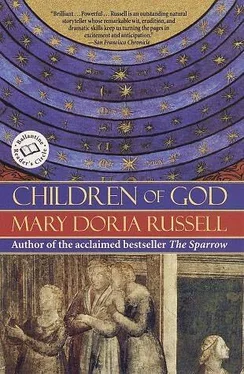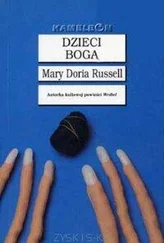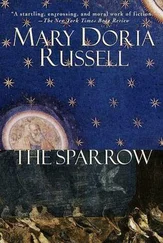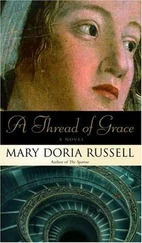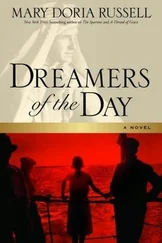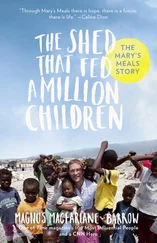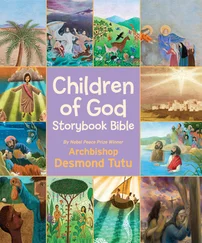Q: Children of God uses parallel narratives to tell its story—that of Mendes and of Sandoz—and also jumps backward and forward in time. As a writer, what’s the hardest thing about moving between these different times and narrative lines?
MDR: Trying to keep the reader oriented, and to make the jumps informative, not annoying! Chapter 21, where we listen to Danny and Suukmel’s conversation, is probably the most difficult—I rewrote that chapter a dozen times trying to figure out how to encapsulate 20 years of Rakhati history as quickly and efficiently as possible. I tried a straight historical narrative, and that didn’t work. I tried a lot of stuff, but ultimately the least bad solution to this narrative problem was to convey the information in a conversation between the two canniest political minds in the story. That way, in addition to describing the effects of the Kitheri revolution, I could peel back a few layers of those two characters as well. It wasn’t a perfect solution, but it was the best I was able to come up with. Writing novels is not an easy game. Aside from that chapter, however, I was pretty pleased with how varying the timelines could be used to project a slanting light on events. I meant for Time itself to be, well, almost a character, in both The Sparrow and Children of God. I wanted to show how time changes perceptions, to demonstrate how little we understand things when we’re in the midst of events, how much perspective the passage of time can bring.
Q: By the end of Children of God, Sofia’s son Isaac makes a discovery that gives a certain meaning to the entire Rakhat venture. Does this meaning justify the suffering sparked by the mission to Rakhat?
MDR: There is a simple message to be found in that music: You are more together than you are apart. Did anyone have to suffer or die for that message to be heard? No! (Just as an aside, the Buddha’s message was heard and is heard, and he didn’t have to be martyred to make his point!) Isaac might just as easily have become obsessed with DNA and music while living in a peaceable Runa village. The beauty of the harmonies he discovered would have been there for the hearing, the implications of the harmony would have been there to be interpreted, even without the revolutions that took place during the same years that Isaac was involved with the DNA music.
But there is such great power in a story—and I imagine that the Rakhati of both species would be drawn to any story that made sense of the upheavals and deaths and suffering and change. They too come into the world hardwired to hear noise and make language out of it! The stories of Genesis and Exodus are so powerful that they’ve been told for 3500 years among Jews and adopted by Christians and Muslims all over the world. Similar stories would probably take form and take root on Rakhat, and who knows what they would sound like a few millennia down the line? I’d be willing to bet that there would be at least three versions of the story!
Q: Is there a moral to this story?
MDR: Don’t be so damned quick to judge! The less we know about someone, the easier we find it to make a snap decision, to condemn or sneer or believe the worst. The closer you get, the more you know about the person or the situation in question, the harder it gets to be sure of your opinion, so remember that, and try to cut people a little slack. Like Emilio says, "Everything we thought we understood—that was what we were most wrong about." So the moral of the story is to be suspicious of your own certainty. Doubt is good.
Steven Oppenheim created the reader’s guide to Children of God.
Visit the Reader’s Circle Web site at www.randomhouse.com/BB/readerscircle
Reading Group Questions and Topics for Discussion
1. How have the unforeseen mistakes of the first visitors to Rakhat influenced the history of the planet? Are there any parallels from our history? What does this story say about the gap between intention and effect? What do you see as the themes of this story?
2. Russell has constructed Children of God using a three-tiered story line: Earth and its standard time; the ship, Giordano Bruno, and its Earth-relative time; and time on Rakhat. The story also contained two parallel narratives: that of Mendes and that of Sandoz. Do you think this makes the story more interesting? Did you find it easy or difficult adjusting to the time jumps?
3. Russell never tells us what happened to the UN party that showed up at the end of The Sparrow and sent Emilio back to Earth. What do you think happened to them? Why does Russell leave the fate of the rescue party a mystery?
4. One reviewer describes the characters in this story as "rather too forgiving to be wholly human." Do you agree? If you were in Sandoz’s shoes, would you be able to work with the people who kidnapped you?
5. At the end of the book Emilio Sandoz makes it very clear to Sofia that he can’t forgive what was done to him. He is ashamed of that—he wishes he could, but he just can’t let go of his hate. Do you think that will ever change for Sandoz? Sandoz also realizes that he can’t hate the children of the men who harmed him, he can’t hate the Jana’ata in general for what Supaari VaGayjur and Hlavan Kitheri and seventeen other men did to him. Is this a moral triumph for the former priest?
6. What price does Danny Iron Horse pay for agreeing to do what feels like a wrong for the right reason? Eventually Sandoz comes to understand the pressures Danny caved in to, but he never misses an opportunity to rake him over the coals for it. What sort of pressures was Danny subjected to? And how does Sandoz make him pay for his decision?
7. History and religious literature are both packed with examples indicated that God’s favor brings not wealth and happiness, but agony and torture. How could Sandoz, a Jesuit priest inculcated with stories of martyred saints, feel so betrayed by God? Is there a difference between what happened to Sandoz and what happened to martyred saints throughout history?
8. Sofia has had all the same traumas as Emilio but unlike Emilio, she did not have sympathetic supporters to help her overcome what happened to her. How does she survive her experiences? How would you describe her reaction to the traumas she has suffered? Why does she become so blind to the suffering of the remaining Jana’ata?
9. In the Coda, Emilio muses that we come into the world hardwired to hear noise and make language, to see a chaos of color and find patterns, to experience random events and make a coherent life out of them. Is it possible that the idea of God is simply a manifestation of that biological drive to impose structure on sensory input?
10. How would you compare Children of God to the first Sandoz/Rakhat book, The Sparrow? Some reviewers consider Children of God a much darker story. Do you agree?
11. Even when he appears to be getting on with his life, Sandoz is caught in the larger machinations of a battle between Fate and Providence. Which do you think wins out in the end? Is there a clear winner? Does this novel provide the answers to Sandoz’s questions about faith?
12. This story forces us to face the task of accepting the less theological and more ethical possibility that God may be merely an idea, yet one that still drives a people to live like children of God who place as much faith in a universal family as they do in the divine. Do you think God is merely an idea or does God really exist?
13. Beyond its determination to see Sandoz fulfill his destiny on Rakhat with or without his consent, why does the Church conspire to kidnap Sandoz and send him back to Rakhat? What purpose does this act serve? What would your reaction be if you were in Sandoz’s shoes? Does the result—Sandoz’s reconnection with God and his coming to terms with what happened to him on the planet—justify his kidnapping? In other words, do the ends justify the means?
Читать дальше
